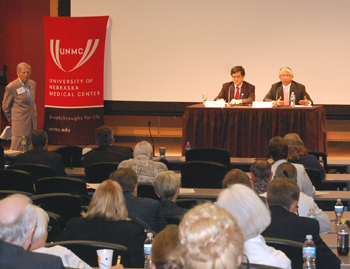 |
William Dinsmoor, chief financial officer for The Nebraska Medical Center, right, makes a point during UNMC’s health care reform conference. Next to Dinsmoor is Keith Mueller, Ph.D., interim dean of the College of Public Health. |
While the diagram made the process look easy, the road will be long and fraught with confusion and misinformation, said Dr. Mueller, interim dean of College of Public Health during Wednesday morning’s Health Care Reform Conference in the Durham Research Auditorium.
More than 225 people from the UNMC campus and Omaha community attended the conference, which was organized by UNMC’s Health Reform Committee to provide vital and impartial information, said Mark Bowen, director, government relations and one of the conference organizers.
“The health reform conference touched the pulse of the area,” Bowen said. “We had their attention.”
The conference was followed by the first in a series of town hall meetings held by U.S. Sen. Ben Nelson on the same issue. More public meetings are scheduled for across the state.
Big issues to tackle in health care reform
UNMC Chancellor Harold M. Maurer, M.D., opened the conference and reviewed what he sees as the three biggest health care issues that face the nation:
- Outrageous cost increases;
- Insurance; and
- Workforce shortage.
In addition, he said there are two big issues facing academic health care centers — reimbursement and workforce development support.
“Health care spending has doubled every 10 years in the past four decades. Something has to be done,” he said.
The status quo is broke
Dr. Mueller, who frequently consults Congress on health care reform, explained provisions in the current legislation and provided an overview of issues.
“We have 47 million or more uninsured in this country, the costs of providing and insuring health care have spiraled out of control and we need to address the workforce shortage,” he said.
Spending more doesn’t equal health
Through a series of graphs and bar charts, William Dinsmoor, chief financial officer for The Nebraska Medical Center, demonstrated that we spend twice as much on health care per capita than any other developed country, yet our outcomes are worse than most of them.
“We need to manage our health care dollars better. In any given year, the top 10 percent of the sickest people in this country account for 64 percent of health care expenses,” Dinsmoor said.
Five different perspectives were then given during a panel discussion that was followed by questions from the audience:
- Jim Partington, executive director, Nebraska Restaurant Association – small business – opposes employer mandates; advocates tort reform;
- Robert E. Synowicki, Jr., executive vice president, Werner Enterprises – large business – opposes public plan; wants pragmatic reform;
- Clement Cypra, Pharmaceutical Research & Manufacturers of America – pharmaceutical – acknowledges it’s time for reform, but it’s complex; the industry has promised to save the government $80 billion over 10 years to help fund reform;
- State Sen. Dave Pankonin, vice chairman, Health and Human Services Committee – state government – cited the Comprehensive Health Insurance Pool (CHIP), an insurance plan for about 7,300 Nebraskans without health insurance, as a high-cost program that could become unnecessary with health reform;
- Pat Bourne, vice president-commercial sales, public affairs and account services, Blue Cross/Blue Shield of Nebraska – insurance – supports employer-based insurance systems; 160 million Americans now receive insurance through their employer.
Questions from the audience quickly focused on the role of prevention in lowering the cost of health care and insurance. Incentives for businesses that provide wellness programs and for individuals who practice healthy lifestyles were discussed.
Primary care need grows
A presentation on the “Impact on the Health Care Workforce” was given by Tom Tape, M.D., professor, internal medicine, who said, “The United States now faces a shortage of 124,000 primary care physicians by 2025 if we don’t act now.
“If you have more primary care physicians, people use the emergency room less,” he said.
But, fewer physicians in training are choosing primary care today, Dr. Tape said, who noted that 10 years ago, 54 percent of internal medicine residents chose primary care. Today that number is down to 23 percent.
Primary care fields such as family medicine and general pediatrics have seen similar declines, he said.
“The elephant in the room today is frankly money,” Dr. Tape said. “Students often graduate from medical school with debt of more than $200,000, so they choose specialties with greater income potential than primary care so as to more quickly pay off their debt.”
Senator’s aide: No socialized medicine in bills
The last speaker at the conference was Joe Britton, health legislative assistant to Nelson, who spoke about what’s ahead for the Congressional process of health care reform.
“We’re headed into a new world. Health care reform is important and we’re trying to get something done,” Britton said. “I want to assure everyone that there is no government takeover and no socialized medicine in these bills.”
Look on UNMC’s health care reform Web page for in-depth information.